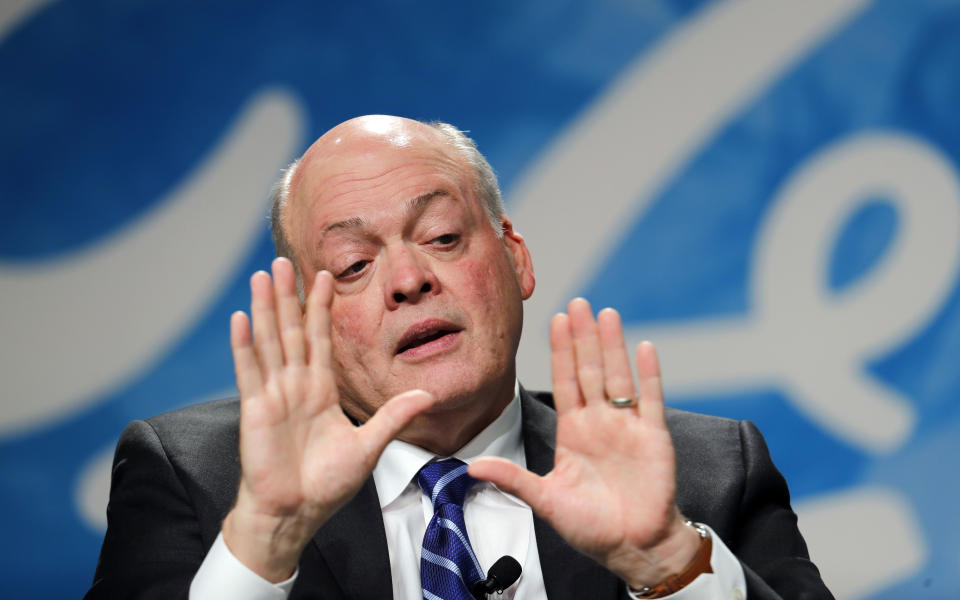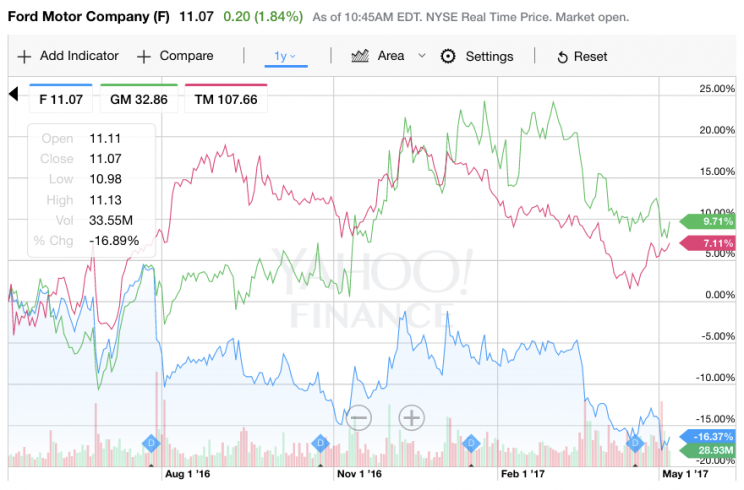Firing the CEO won’t solve Ford’s problem
A couple of years ago, Mark Fields declared that Ford (F) is no longer a car manufacturer, but a “mobility company” instead. Nobody bought it.
Ford just fired Fields, a 28-year company veteran who had been CEO since 2014. “We need to reenergize the business,” Ford Executive Chairman Bill Ford said during a press conference, discussing the news. “Speed up our decision-making.”
That may be the easy part. What Ford really needs to do is convince skeptical investors that it has a future. Though the storied automaker was present at the creation of a giant, transformative industry, its market value now lags behind upstart Tesla (TSLA), and Wall Street analysts see limited growth prospects. Many analysts think Google parent Alphabet (GOOGL)—which has never built a car, and may never—is further ahead on tantalizing technologies such as autonomous driving than Ford and other companies that have been in the business for decades.

Bill Ford and the company’s new CEO, Jim Hackett, emphasized that Ford needs to move faster and be more aggressive. The question is—be more aggressive at what? Key future technologies such as self-driving cars are still largely in the research stage. Ride-sharing services such as Uber and Lyft have obviously caught on, but so far, they threaten the taxi business more than the auto business. Tesla’s soaring stock price is the envy of every automaker, yet the company has never turned an annual profit and electric cars are just 0.3% of the total market. Ford sold about 87 times as many cars as Tesla in 2016–yet is somehow worth less.
Besides, Ford is already involved in all those things. Fields himself established new “smart mobility” operations while overseeing billions of dollars of new investments in future technologies. Investors want to know when those investments will pay off, and the answer is—whenever they pay off for Alphabet, Tesla, and every other company investing in the future of transportation.
Meanwhile, Ford has been nicely profitable under Fields, with more than $13 billion in net earnings during the last three years. In fact, Bill Ford struggled to explain what Fields did wrong, exactly. “I don’t think we missed any opportunities,” he said. “We have to move fast. That will happen through empowerment.” What he could have said is that Ford’s profit margin lags its biggest competitors, including General Motors (GM) and Toyota (TM).

The one obvious problem under Fields was the stock price, which fell 17% during the last 12 months, while the broader market was up 15%. Most automakers have been underperforming the market, but Ford has underperformed more. That is partly due to Wall Street’s perception of the big automakers as dinosaurs overdependent on gas-guzzling trucks and SUVs, but also to the belief that strong sales have peaked and a slowdown is coming.
Hackett will have a hard time convincing investors otherwise. “Ford’s board understands the gravity of the industry challenge and is trying everything in its power to help improve the odds that Ford has a relevant long-term place in the auto/transportation industry,” Morgan Stanley analyst Adam Jonas wrote of the move to fire Fields. In addition to new competition from Silicon Valley, the automakers face concerns about sales that may have peaked and left too many consumers holding too much auto-related debt, which could crimp sales in the future. And that’s assuming no recession is in the offing. Another problem is an unusually large number of leased vehicles that will soon return to dealers, for sale in the used market. That glut will depress prices for both used and new models and force more discounting by automakers.
Still, Ford is expected to earn more than $6 billion in profit in each of the next two years, according to S&P Capital IQ. And if Hackett does make faster inroads into future technologies, it will be with people and investments his predecessor put into place. Even though he got fired, Fields will bring a pretty strong resume to his next job.
Confidential tip line: rickjnewman@yahoo.com
Read more:
Rick Newman is the author of four books, including Rebounders: How Winners Pivot from Setback to Success. Follow him on Twitter: @rickjnewman.


